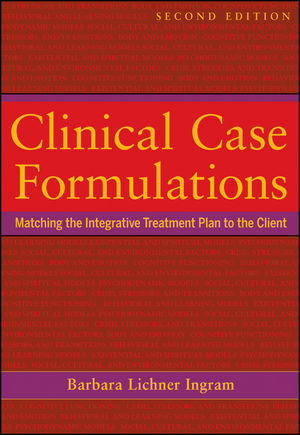
Clinical Case Formulations
John Wiley & Sons Inc (Verlag)
978-1-118-03822-2 (ISBN)
Praise for Clinical Case Formulations Matching the Integrative Treatment Plan to the Client, Second Edition
"[Barbara Ingram has put] a career into the development of this book and it is wonderful! My students love that it was written with them in mind and they love the statements designed to reduce anxiety and normalize the learning process. This is an excellent book!"—Amy M. Rees-Turyn, PhD Associate Professor of Counseling Psychology, Lewis & Clark College
A step-by-step model for individualized case conceptualization
Fully revised and updated, the second edition of Clinical Case Formulations provides step-by-step tools and insightful guidance for moving from first contact with a client to the development of an effective, personalized treatment plan. Addressing the essential question every therapist faces—How do I create a treatment plan that is the best match for my client?—this unique resource provides a systematic and thoughtful method for integrating ideas, skills, and techniques from different theoretical approaches. It combines empirical research and clinical experience to create a case formulation that is tailor-made for the client.
This comprehensive resource offers two tools to guide case formulations: a problem-oriented framework, with a list of 28 standards for evaluating its application, and a set of 30 core clinical hypotheses derived from the knowledge bases of psychology, psychiatry, counseling, and social work professions.
The new edition includes:
Hypotheses on Emotional Focus, Trauma, and Metacognitive Perspective
More detailed attention given to empirically supported therapies such as Dialectical Behavior Therapy (DBT) and Acceptance and Commitment Therapy (ACT)
Discussion on the importance of bringing cultural competence to case formulation tasks with every client
Skill-building activities throughout the text
Offering a thorough framework to help clients experience effective clinical service, practitioners will learn to conceptualize clients' needs in ways that lead to strong and individualized treatment plans, as well as advice and guidance on what to do when selected interventions fail to produce the expected benefits.
BARBARA LICHNER INGRAM, PhD, is a Professor of Psychology at Pepperdine University in Los Angeles, California, where she has served on the faculty since 1978. She was instrumental to the creation of their APA-approved PsyD program in 1985 and continues to be an active participant in that endeavor.
List of Tables ix
Preface xiii
Acknowledgments xvii
Part One Case Formulation Skills 1
Chapter 1 A Framework for Clinical Case Formulations 3
Chapter 2 Gathering Data 19
Chapter 3 Defining Problems 41
Chapter 4 Setting Outcome Goals 61
Chapter 5 Organizing and Presenting the Database 73
Chapter 6 Creating the Formulation 87
Chapter 7 Writing the Treatment Plan 95
Part Two Thirty Core Clinical Hypotheses 111
Chapter 8 Crisis, Stressful Situations, Transitions, and Trauma 117
Chapter 9 Body and Emotions 157
Chapter 10 Cognitive Models 197
Chapter 11 Behavioral and Learning Models 225
Chapter 12 Existential and Spiritual Models 257
Chapter 13 Psychodynamic Models 289
Chapter 14 Social, Cultural, and Environmental Factors 331
Chapter 15 Practice, Practice, Practice 373
References 385
Appendix I Useful Charts 413
Appendix II Useful Forms 421
Appendix III Case Material for Practice 425
Appendix IV Answers and Samples for Activities 431
Author Index 461
Subject Index 473
| Erscheint lt. Verlag | 30.12.2011 |
|---|---|
| Zusatzinfo | Drawings: 0 B&W, 0 Color; Tables: 0 B&W, 0 Color |
| Verlagsort | New York |
| Sprache | englisch |
| Maße | 178 x 252 mm |
| Gewicht | 726 g |
| Themenwelt | Geisteswissenschaften ► Psychologie ► Klinische Psychologie |
| Medizin / Pharmazie ► Medizinische Fachgebiete | |
| ISBN-10 | 1-118-03822-3 / 1118038223 |
| ISBN-13 | 978-1-118-03822-2 / 9781118038222 |
| Zustand | Neuware |
| Haben Sie eine Frage zum Produkt? |
aus dem Bereich


